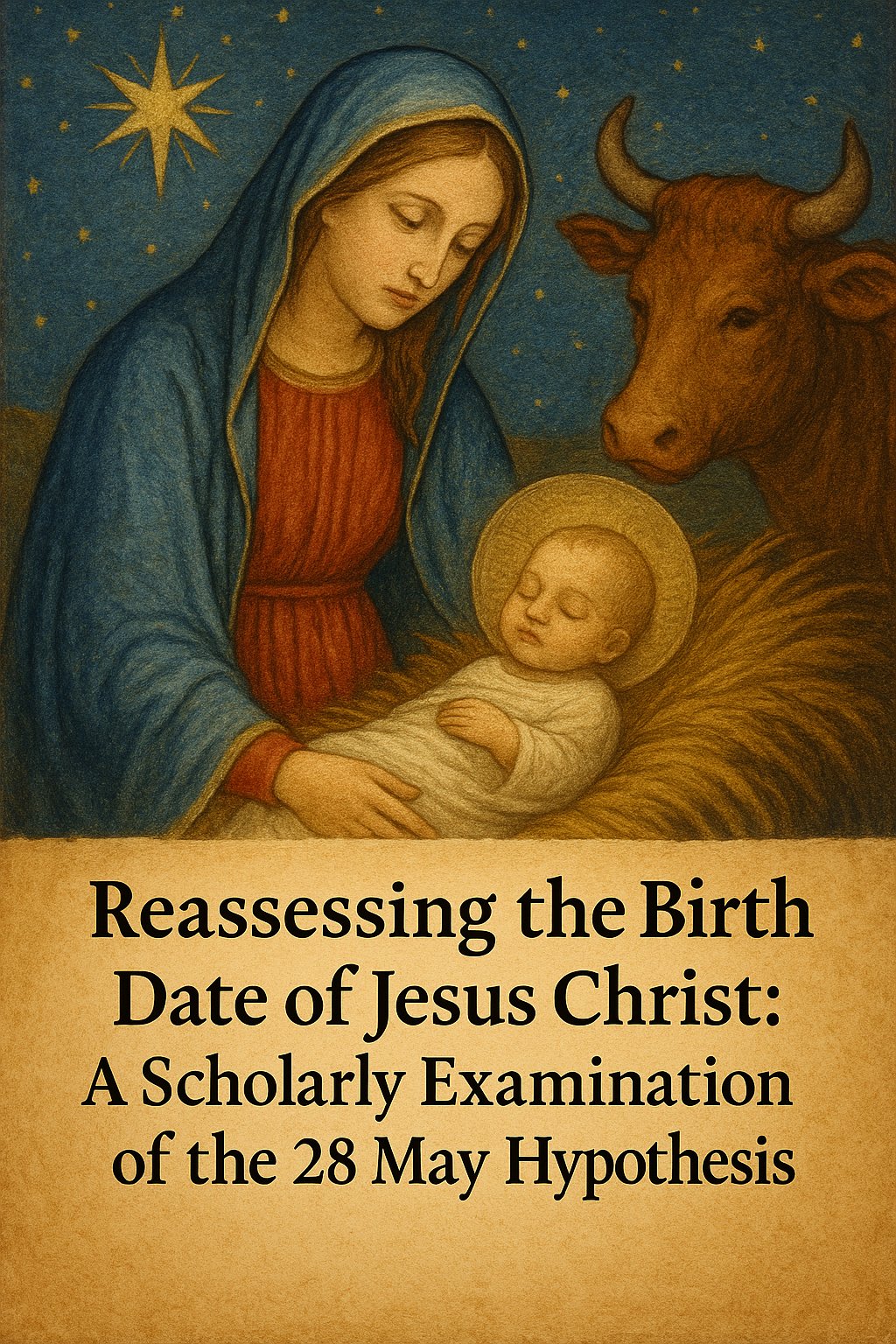
Reassessing the Birth Date of Jesus Christ: A Scholarly Examination of the 28 May Hypothesis
Abstract
The precise date of Jesus Christ’s birth remains a subject of scholarly debate. Traditional celebrations on December 25 have been questioned due to historical, astronomical, and cultural considerations. This article explores the hypothesis that Jesus was born on 28 May, taking into account ancient calendar systems, biblical narratives, and astronomical data.
Introduction
The nativity of Jesus Christ is central to Christian theology, yet the exact date of his birth is not specified in the canonical gospels. While December 25 is widely celebrated as Christmas, this date was established centuries after the events described in the New Testament. Scholars have proposed various dates based on historical records, scriptural analysis, and astronomical phenomena. This study examines the plausibility of a 28 May birth date, considering the alignment of ancient calendars and historical context.
Ancient Calendars and the New Year
Prior to the adoption of the Gregorian calendar, several cultures recognized different dates as the beginning of the new year. In medieval Europe, for instance, 1 April was often considered New Year’s Day. If April is regarded as the first month, May becomes the second, positioning 28 May as a date of potential significance. This calendrical perspective invites a re-examination of traditional assumptions about the timing of Jesus’s birth.
Biblical Narratives and Chronological Indicators
The Gospel of Luke mentions that shepherds were tending their flocks at night when Jesus was born (Luke 2:8). This detail suggests a time of year when shepherds would be outdoors, which is less likely during the colder months. Additionally, the account of Zechariah’s temple service and the subsequent conception of John the Baptist provides a timeline that, when analyzed, could point to a spring or early summer birth for Jesus.United Church of God
Astronomical Considerations
The Star of Bethlehem, described in the Gospel of Matthew, has been the subject of various astronomical interpretations. Some scholars propose that this “star” was a conjunction of planets or other celestial events observable at specific times. While many of these events are dated to periods other than May, the lack of consensus on the nature of the star allows for the possibility that an event in late May could align with the biblical account.arXiv
Historical Context and Early Christian Thought
Early Christian writers did not agree on the date of Jesus’s birth. Clement of Alexandria, writing in the late second century, noted that some believed Jesus was born on 20 May. This diversity of opinion in early Christian thought indicates that the exact date was not universally established and supports the exploration of alternative dates such as 28 May.Wikipedia
Conclusion
While definitive evidence for a 28 May birth date for Jesus Christ is lacking, the hypothesis is supported by considerations of ancient calendars, biblical narratives, and historical context. The traditional December 25 date is not conclusively supported by scriptural or historical data, and alternative dates like 28 May merit scholarly attention. Further interdisciplinary research combining theology, history, and astronomy could provide additional insights into this enduring question.
References
-
Dimitrov, V. S. (2023). Dating the Birth of Jesus Christ: Birth Not in December? Retrieved from https://www.researchgate.net/publication/376379906_Dating_the_Birth_of_Jesus_Christ_Birth_not_in_DecemberResearchGate
-
Chadwick, J. R. (2010). Dating the Birth of Jesus Christ. BYU Studies Quarterly, 49(4), 5–38.BYU ScholarsArchive
-
Koplitz, M. (2024). Does it Matter When Jesus was Born? An Examination of the Question Using Ancient Bible Study Methods. Retrieved from https://www.researchgate.net/publication/380365042_Does_it_Matter_When_Jesus_was_Born_An_examination_of_the_question_using_Ancient_Bible_Study_methodsResearchGate
-
Wikipedia contributors. (2025). Date of the birth of Jesus. In Wikipedia, The Free Encyclopedia. Retrieved from https://en.wikipedia.org/wiki/Date_of_the_birth_of_JesusWikipedia
-
United Church of God. (2004). Biblical Evidence Shows Jesus Christ Wasn’t Born on Dec. 25. Retrieved from https://www.ucg.org/good-news/good-news-magazine-november-december-2004/biblical-evidence-shows-jesus-christ-wasnt-bornUnited Church of God
-
Time Magazine. (2015). What We Know About When Jesus Was Actually Born. Retrieved from https://time.com/4157162/jesus-born-christmas/Time
-
Wikipedia contributors. (2025). Laurentius Suslyga. In Wikipedia, The Free Encyclopedia. Retrieved from https://en.wikipedia.org/wiki/Laurentius_SuslygaWikipedia
-
Wikipedia contributors. (2025). Sextus Julius Africanus. In Wikipedia, The Free Encyclopedia. Retrieved from https://en.wikipedia.org/wiki/Sextus_Julius_AfricanusWikipedia+1Wikipedia+1
-
Wikipedia contributors. (2025). Anno Domini. In Wikipedia, The Free Encyclopedia. Retrieved from https://en.wikipedia.org/wiki/Anno_DominiWikipedia
-
Wikipedia contributors. (2025). Byzantine calendar. In Wikipedia, The Free Encyclopedia. Retrieved from https://en.wikipedia.org/wiki/Byzantine_calendarWikipedia
-
Wikipedia contributors. (2025). James Ussher. In Wikipedia, The Free Encyclopedia. Retrieved from https://en.wikipedia.org/wiki/James_UssherWikipedia
-
Starostin, D. N. (2024). Astronomical Lunisolar Cycles and Late Antique Chronology. arXiv preprint arXiv:2403.03682.arXiv
-
Schaefer, B. E. (2016). Astronomical and Historical Evaluation of Molnar’s Solution for the Star of Bethlehem. arXiv preprint arXiv:1612.07642.arXiv



